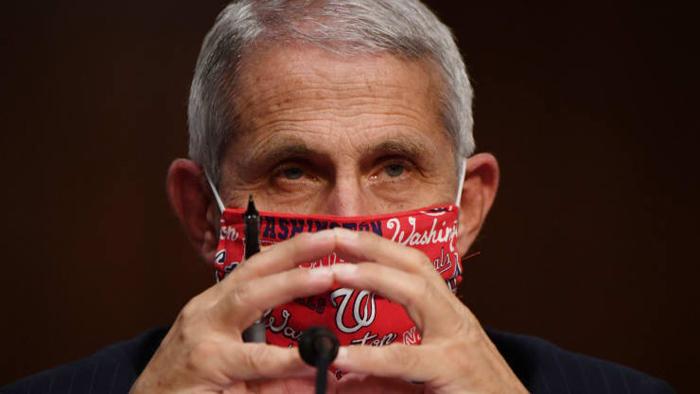Fauci, the top infectious disease expert in the United States, recently pointed out that signs of mutation of the new coronavirus have been found, and this mutation may make the virus spread more easily, but it is still unclear whether people infected with this new mutated pathogen will be more seriously ill.

Dr Anthony Fauci, director of the National Institute for Allergy and Infectious Diseases prepares to testify ahead of a Senate Health, Education, Labor and Pensions (HELP) Committee hearing on Capitol Hill in Washington, US, June 30, 2020. Kevin Dietsch / Reuters
The coronavirus has mutated in a way that might help the pathogen spread more easily, White House health advisor Dr. Anthony Fauci said Thursday.
White House health adviser Dr. Anthony Fauci said on Thursday (July 2) that the new coronavirus has mutated, which may make the pathogen more easily spread.
Research is underway to confirm the possible mutation and its implications, Fauci said, adding that “there's a little dispute about it.” Viruses naturally mutate and scientists have previously said they have observed minor mutations in the coronavirus that have not impacted its ability to spread or cause disease in any significant way.
Fauci said research is currently underway to confirm this possible mutation and its potential impact. He added: "There is a little controversy about virus mutation." Viruses mutate naturally, and scientists have previously noted that they have observed slight mutations in the new coronavirus, but it did not significantly affect the virus's ability to spread or cause disease. .
The possible mutation that Fauci cited was reported on by investigators at Los Alamos National Laboratory in an article published by the journal Cellearlier Thursday. Virologists at Scripps Research in Florida also wrote about the mutation last month, saying it "enhances viral transmission." It's unclear when the mutation might have occurred.
Researchers at Los Alamos National Laboratory reported what Fauci said may be the variant in an article published early Thursday in the journal Cell. Last month, virologists at the Scripps Research Institute in Florida also wrote a report on virus mutations, stating that mutations "accelerate the spread of the virus." It's unclear when the virus mutated.
"The data is showing there's a single mutation that makes the virus be able to replicate better and maybe have high viral loads," Fauci said in an interview with The Journal of the American Medical Association's Dr. Howard Bauchner. "We don't have a connection to whether an individual does worse with this or not; it just seems that the virus replicates better and may be more transmissible."
"The data shows that there is a single mutation that allows the virus to replicate better and maybe increase the viral load," Fauci said in an interview with JAMA editor-in-chief Dr. Howard Bauschner. "We don't know for sure. Will individuals become more seriously ill after being infected with this mutated virus? It seems that this mutated virus can replicate better and may spread faster."
He added that researchers are “still at the stage of trying to confirm that.”
He added that researchers are "still in the stage of trying to confirm it."
The World Health Organization and its team of global researchers have been keeping an eye on more than 60,000 different genetic sequences of the coronavirus collected from samples taken all over the world.
The World Health Organization and its global research team have been paying close attention to more than 60,000 samples of different genetic sequences of the new coronavirus collected from around the world.
All viruses evolve, or mutate, throughout their lifespan. RNA viruses like the coronavirus mutate more quickly than some other viruses, top WHO officials told reporters last month, because unlike human DNA, RNA viruses do not have “natural error checking,” meaning that the code of the virus cannot correct itself.
All viruses evolve or mutate during their life cycle. Top WHO officials told reporters last month that RNA viruses like COVID-19 mutate faster than some other viruses because, unlike human DNA, they do not have "natural error checking mechanisms." This means that the virus's genetic code cannot correct itself.
Not every mutation will lead to any meaningful change in the behavior of the virus or its impact on humans, the WHO previously said. Nonetheless, the United Nations health agency has formed a comprehensive data base of genetic sequences to investigate any potential mutations.
The World Health Organization has previously said that not every mutation will lead to significant changes in the behavior of the virus or its impact on humans. However, the U.N. health agency has assembled a comprehensive database of genetic sequences to investigate any potential variants.
Earlier Thursday, Dr. Soumya Swaminathan, the WHO's chief scientist, told reporters at a news briefing that “natural mutations” of the virus are to be expected. She explained that there are certain “domains” of the virus that are “more critical, ” such as the spike protein, from which the coronavirus gets its name.
Earlier on Thursday, Dr. Soumya Swaminathan, the World Health Organization's chief scientist, told reporters at a press conference that "natural mutation" of the virus was possible. She explained that certain "areas" of the virus were "more critical," such as the spike protein, from which the new coronavirus takes its name.
"If major mutations occurred in those domains, it might actually affect the development of vaccines," she said.
"If there are major mutations in major areas such as the spike protein, it could affect vaccine development," she said.
English source: CNBC
Translator & Editor: Dani
Source: China Daily.com
Articles are uploaded by users and are for non-commercial browsing only. Posted by: Lomu, please indicate the source: https://www.daogebangong.com/en/articles/detail/fu-qi-xin-guan-bing-du-ke-neng-yi-jing-fa-sheng-bian-yi-bian-de-geng-ju-chuan-ran-xing.html

 支付宝扫一扫
支付宝扫一扫 
评论列表(196条)
测试